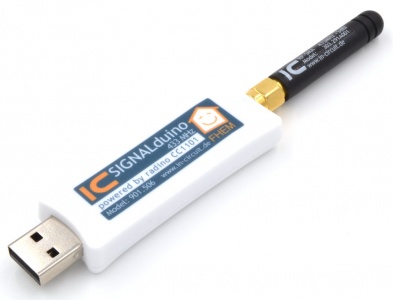Difference between revisions of "SIGNALduino Stick"
(→Hardware) |
|||
| Line 30: | Line 30: | ||
*Antenna 5cm +3dBi included | *Antenna 5cm +3dBi included | ||
| − | =Connecting the | + | =Connecting the SIGNALduino Stick to FHEM= |
| − | This is a short instruction on checking if your | + | This is a short instruction on checking if your SIGNALduino Stick is working correctly and connecting it to FHEM running on a raspberry Pi |
| − | The | + | The test setup used by us looks like this: |
*Raspberry Pi 3 Model B running [https://www.raspberrypi.org/downloads/raspbian | Raspbian Stretch Lite] | *Raspberry Pi 3 Model B running [https://www.raspberrypi.org/downloads/raspbian | Raspbian Stretch Lite] | ||
**connected to the home network via LAN-Cable | **connected to the home network via LAN-Cable | ||
**with FHEM installed and updated, according to [https://debian.fhem.de/html/nightly.html | this instructions] | **with FHEM installed and updated, according to [https://debian.fhem.de/html/nightly.html | this instructions] | ||
| − | *[ | + | *[SIGNALduino Stick] 868MHz |
*''ELV FHT80TF-2'' Funk-Tür / Fenster-Melder | *''ELV FHT80TF-2'' Funk-Tür / Fenster-Melder | ||
*PC running Win7 Professional 64Bit | *PC running Win7 Professional 64Bit | ||
| − | ==Checking the | + | ==Checking the SIGNALduino Firmware== |
| − | The [[ | + | The [[SIGNALduino Stick]] comes with preinstalled [https://github.com/RFD-FHEM/RFFHEM/commit/257aaeb19b0186121f79faf329496d7ecfd45ec9#diff-333ef8333f74797a8b4f43ef7f67ef20 | SIGNALDuino_radinoCC1101.hex] firmware. To check if it is working correctly, connect the Stick to an USB port of your PC and open a serial connection using a serial port monitor e.g. Putty at 57600 Baud. Starting the connection leads to: |
Init eeprom to defaults after flash | Init eeprom to defaults after flash | ||
| Line 57: | Line 57: | ||
V 3.3.1-dev SIGNALduino cc1101 (868Mhz )- compiled at Mar 10 2017 23:27:29 | V 3.3.1-dev SIGNALduino cc1101 (868Mhz )- compiled at Mar 10 2017 23:27:29 | ||
| − | The shown frequency depends on the Version of the [[ | + | The shown frequency depends on the Version of the [[SIGNAduino Stick]]. |
| − | If this message shows up, the | + | If this message shows up, the SIGNALduino Firmware works correctly. |
Revision as of 12:47, 12 March 2018
THIS PAGE IS CURRENTLY UNDER CONSTRUCTION
Hardware
The SIGNALduino Stick combines our fully Arduino compatible radino CC1101 Module with the handy format of a USB Stick. The SIGNALduino Stick comes in two different versions, either with 433 or 868MHz radio front end.
The utilized microcontroller is an Atmega 32U4 with 8MHz clock frequency. The CC1101 RF-Transceiver form Texas Instruments is used as radio front end either configured in 433MHz or 868MHz mode.
It is able to receive and transmitt different communication protocols depending on the utilized firmware. In this manner it can be used to receive and transmit data from/to different devices via a FHEM Server.
The SIGNALduino Stick comes preflashed with the SIGNALduino_radinoCC1101.hex firmware.
The SIGNALduino Stick behaves like an Arduino Micro and can be programmed using the Arduino IDE.
To reprogramm the SIGNALduino Stick it has to be set to bootloader mode by pressing the reset button twice. (bootloader mode is indicated by fading status LED)
Features:
- Arduino campatible (Atmega 32U4 Processor, 8MHz)
- CC1101 Transceiver (433 or 868MHz)
- USB-A Plug
- RP-SMA Antenna Connector
- Input voltage: 5 VDC (USB)
- on Board 3.3V regulator
- Reset- and boot-select-(BSL) Button
- User LED, RX/TX LEDs and Power-LED
- available with 433 oder 868MHz transceiver
- Antenna 5cm +3dBi included
Connecting the SIGNALduino Stick to FHEM
This is a short instruction on checking if your SIGNALduino Stick is working correctly and connecting it to FHEM running on a raspberry Pi
The test setup used by us looks like this:
- Raspberry Pi 3 Model B running | Raspbian Stretch Lite
- connected to the home network via LAN-Cable
- with FHEM installed and updated, according to | this instructions
- [SIGNALduino Stick] 868MHz
- ELV FHT80TF-2 Funk-Tür / Fenster-Melder
- PC running Win7 Professional 64Bit
Checking the SIGNALduino Firmware
The SIGNALduino Stick comes with preinstalled | SIGNALDuino_radinoCC1101.hex firmware. To check if it is working correctly, connect the Stick to an USB port of your PC and open a serial connection using a serial port monitor e.g. Putty at 57600 Baud. Starting the connection leads to:
Init eeprom to defaults after flash ccFactoryReset done CCVersion=20 CCPartnum=0 CC1101 found Starting timerjob receiver enabled
Typing V<ENTER> shows a message like this:
V 3.3.1-dev SIGNALduino cc1101 (868Mhz )- compiled at Mar 10 2017 23:27:29
The shown frequency depends on the Version of the SIGNAduino Stick. If this message shows up, the SIGNALduino Firmware works correctly.
